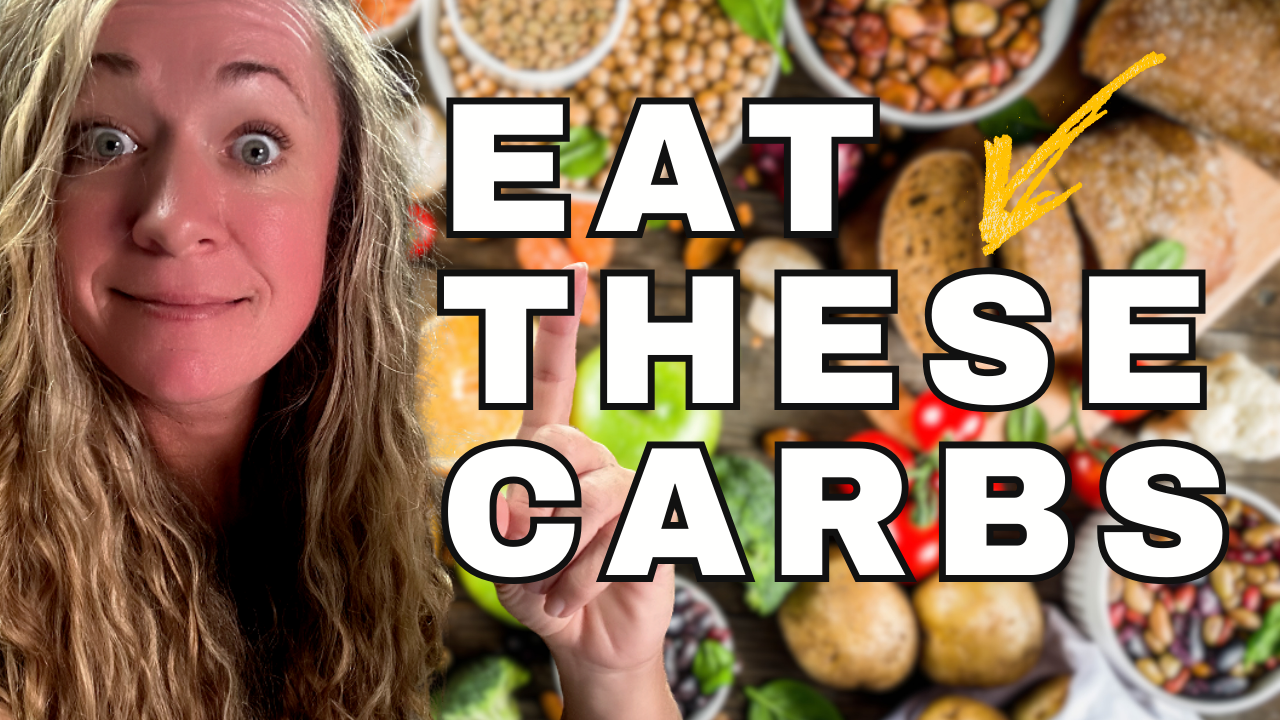
Carbs Explained: How Much You Really Need & The Best Ones to Eat
Carbs get a bad rap.
Scroll through social media long enough and you’ll find plenty of people telling you to cut them out completely if you want to lose weight or be healthy.
Here’s the truth: Your body needs carbohydrates.
The key is choosing the right ones and eating the right amount for you.
In this post, I’ll walk you through:
-
Why carbs are essential for your health and energy
-
The difference between good carbs and not-so-good carbs
-
How much you really need
-
Easy tips for adding more healthy carbs to your day without overwhelm
Why Your Body Needs Carbohydrates
Carbohydrates are your body’s primary source of energy. They fuel your muscles, your brain, and every cell in your body.
When you cut carbs too low, you might experience fatigue, brain fog, poor workout performance, and even mood changes.
The problem isn’t carbs — it’s the type and amount you’re eating.
Not All Carbs Are Created Equal
Some foods we call “carbs” aren’t really food anymore — they’re food-like products.
Think chips, cookies, pastries, sugary cereals… many of these started out as whole foods but have been processed so heavily (and with so many additives) that your body doesn’t get much nutrition from them.
The issues with highly processed carbs:
-
They’re addictive. Food scientists design them to light up your brain’s reward centers so you keep coming back for more.
-
They’re calorie-dense but nutrient-poor. You get a lot of energy (calories) but not much nutrition, which is the opposite of what you want for health or weight loss.
The Best Carbs to Eat
When it comes to carbs, the best choices are as close to their natural form as possible. These are nutrient-dense, lower in calories, and much harder to overeat.
Healthy carb sources include:
-
Fruits
-
Vegetables
-
Whole grains like oats, quinoa, brown rice, and barley
-
Legumes like beans and lentils
-
Minimally processed breads and wraps made with whole grains
I tell my clients: Make sure each meal has at least one high-quality carb source. This keeps your energy steady, your plate balanced, and your diet more sustainable long-term.
How to Build More Fruits and Vegetables Into Your Day
If you’re not eating many whole-food carbs right now, don’t try to overhaul everything overnight.
Instead, start small:
-
Add one extra serving of fruit or vegetables to your day
-
Swap a refined carb for a whole grain (like oats instead of sugary cereal)
-
Try adding vegetables into dishes you already eat (spinach in eggs, zucchini in pasta sauce)
Gradual changes stick better — and that’s the exact approach I use in my 30-Day Well Fed Kickstart program.
How Many Carbs Do You Need?
Everyone’s needs are different. Your ideal carb intake depends on:
-
Your body size
-
Your muscle mass
-
Your daily activity level
-
Your fitness goals
Active people — especially those who lift weights or spend a lot of time on their feet — generally need more carbs than someone who’s mostly sedentary.
Want to find your exact numbers?
Try my free Macro Calculator here — it takes into account your size, activity, and goals to give you a personalized carb target.
Pairing Carbs With Protein
Eating carbs in balance with protein can help regulate your blood sugar, improve muscle recovery, and keep you fuller for longer.
For example:
-
Oatmeal + protein powder + berries
-
Brown rice + grilled chicken + vegetables
-
Whole grain wrap + turkey + avocado
- Protein Shake + a fruit
We’ll dive deep into protein in Part 3 of this Easy Macros series, so stay tuned!
The Bottom Line on Carbs
Carbs aren’t the enemy — but choosing the right ones and eating the right amount is key.
Focus on whole-food carbs most of the time, pair them with protein, and adjust your intake based on your size, activity, and goals.
If you want step-by-step guidance on building better meals and creating sustainable habits, check out my 30-Day Well Fed Kickstart. You’ll get daily action steps, nutrition resources, and the exact process I use with my clients to make changes that last.
Free Resources: (These are really good. I'm slightly biased, but also...they are good 😊)
📊 Macro Calculator
📘 Free Meal Prep Guide
Keep going!
Coach Ashleigh 🦈
